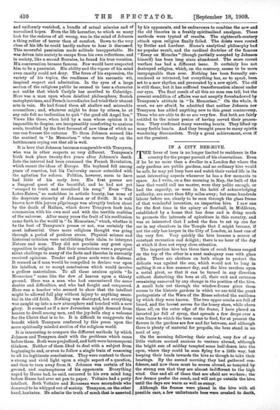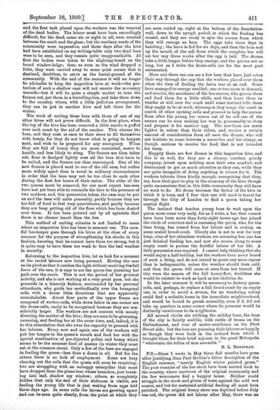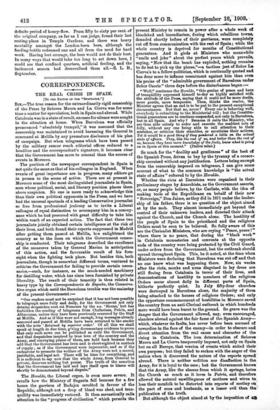IN A CITY BEE-HIVE.
THE lover of bees is no longer limited to residence in the
country for the proper pursuit of his observations. Even
if he be no more than a dweller in a London flat where the only gardens are public gardens, and no ordinary hive would be safe, he may yet keep bees and watch their varied life in its most interesting aspects whenever he has a few moments to spare. As I write, on a fine morning in May, the bulk of the bees that would call me master, were they polite enough, or had the capacity, or were in the habit of acknowledging authority, are more than fifty miles away ; but some hundreds labour before me, clearly to be seen through the glass frame of that wonderful invention, an inspection hive. I saw one for the first time in the apiary at Southall, in Middlesex, established by a house that has done and is doing much to promote the interests of apiculture in this country, and was so interested that I asked the firm to set up one for me in my chambers in the Temple that I might become, if not the only bee-keeper in the City of London, at least one of the very few. Very quickly the hive became a source of constant recreation and delight ; there is no hour of the day at which it does not repay close attention.
The inspection hive has three tiers of comb frames ranged on the top of the other in a neat mahogany case with glass sides. There are shutters on both wings to protect the delicate wax against the sun, which would not be long in melting it on a fine summer day, and the hive revolves upon a metal pivot, so that it can be turned in any direction without disturbing the bees at all, their exit and entrance remaining unmoved by any change in the position of the hive. A small hole cut through the window-frame gives them access to the historic gardens in which we are told the great protagonists of the Wars of the Roses selected the emblems by which they were known. The two upper combs are full of brood, and the lowest serves for the honey store, while above them all, on the outer edge of the frame, I have placed an inverted jar full of syrup, that spreads a few drops over a wire frame to which the bees come to feed, for at present the flowers in the gardens are few and far between, and although there is plenty of material for propolis, the bees stand in no need of any.
On the morning following their arrival, very few of my little visitors seemed anxious to venture abroad, although the bright sun of midday tempted some half-dozen into the open, where they could be seen flying for a little way, but keeping their heads towards the hive as though to take their bearings. By the second morning they had gathered con- fidence, and now there must be scores abroad, so tempted by the strong sun that they are almost indifferent to the high wind. One and all of those that are afield are workers ; the few drones prefer the comb, and will not go outside the hive until the days are warm as well as sunny.
Although the frames were placed in the hive with all possible care, a few unfortunate bees were crushed to death,
and the first task placed upon the workers was the removal of the dead bodies. The labour must have been exceedingly difficult, for the dead, some six or eight in all, were crushed between the comb and the glass ; but the sanitary needs of the community were imperative, and three days after the hive had been established on my writing-table only two dead bees were to be seen, and they remain quite unapproachable. At first the bodies were taken to the alighting-board on the broad window-ledge ; then, as soon as the wind dropped a little, they were carried away to some quiet corner that is destined, doubtless, to serve as the burial-ground of the community. With the end of the summer it will no longer be advisable to keep the inspection hive at work—the pro- tection of such a shallow case will not ensure the necessary warmth—but it will be quite a simple matter to take the frames out, put them in a travelling-box, and take them down to the country, where, with a little judicious arrangement, they can be put in another hive and left there for the winter.
The work of uniting these bees with those of one of my other hives will not prove difficult. In the first place, when the top of the hive has been removed a little smoke is puffed over each comb by the aid of the smoker. This alarms the bees, and they rush at once to their store to fill themselves with honey, for they do not know what is going to happen next, and wish to be prepared for any emergency. When they are full of honey they are more contented, easier to handle, and less likely to sting. The frames are then taken out, flour is dredged lightly over all the bees that have to be united, and the frames are then rearranged. One of the new frames is placed next to one of the old ones, but rather more widely apart than is usual in ordinary circumstances in order that the bees may not be too close to each other during the first few hours of their union. The elder of the two queens must be removed, for our most expert bee-men have not yet been able to reconcile the hive to the presence of two mothers, and, this precaution taken, the case may be put on and the bees will unite peaceably, partly because they are too full of food to feel very quarrelsome, and partly because they are busy getting rid of the flour which has been dusted over them. It has been pointed out by all apiarists that there is no cleaner insect than the bee.
This method of uniting colonies is not limited to cases where an inspection hive has been in summer use. The care- ful bee-keeper goes through his hives at the close of every summer for the purpose of strengthening his stocks in this fashion, knowing that he cannot have them too strong, but it is quite easy to have them too weak to face the bad weather in security.
Returning to the inspection hive, let us look for a moment at the varied labours now being pursued. Moving the case on its pivot so that it catches the light without receiving the full force of the sun, it is easy to see the queen-bee pursuing her path over the comb. This is not the period of her greatest activity, and she is not working at a very great pace, but she proceeds in a leisurely fashion, surrounded by her personal attendants, who guide her methodically over the hexagonal cells with a dozen little directions that are apparently unmistakable. About four parts of the upper frame are composed of worker-cells, while down below in one corner are the drone-cells, easily to be recognised because they are con- siderably larger. The workers are not content with merely directing the mother of the hive ; they are seen to be grooming, caressing, and feeding her at the same time, and, indeed, it is to this stimulation that she owes the capacity to proceed with her labours. Every now and again one of the workers will put her tongue in the queen's mouth and feed her with the special combination of pre-digested pollen and honey which seems to be the summer food of queens (in winter they must eat at the common store). Only a few of the bees are engaged in feeding the queen—less than a dozen in all. But for the others there is no lack of employment. Some are busy clearing out the cells that the queen will soon be requiring ; two are struggling with an unhappy caterpillar that must have dropped from the plane-tree whose branches, just break- ing into leaf, shadow my window; others, so completely hidden that only the end of their abdomen is visible, are feeding the young life that is just waking from eggs laid three days ago. In some cells the larvae are growing apace and can be seen quite clearly, from the point at which they
are seen curled up, right at the bottom of the foundation- wall, down to the nymph period, at which the feeding has ceased, and they are ready to spin the cocoon from which they will emerge as bees. The eggs take three days in hatching ; the larva is fed for six days, and then the bees seal up the mouth of the cell from which the complete bee will eat her way three weeks after the egg is laid. The drones take a little longer before they emerge, and the queens not so long, but as I write the drone-cells are for the most part untenanted.
Here and there one can see a few bees that have just eaten their way through the cap that the workers placed over them when the time of feeding the larva was at an end. Some have managed to emerge unaided; one or two seem to demand, and receive, the assistance of the bee-nurses, who groom them and feed them for a little while, and then leave them to wander at will over the comb until some instinct tells them they ought to be at work, whereupon they range the comb in search of other opening cells and proceed to help the nurses. Soon after the young bee comes out of its cell one of the nurses can be seen making her way in, presumably to clean and prepare it for another egg. The new-born are much lighter in colour than their elders, and receive a certain amount of consideration from all save the drones, who will not hesitate to come between a nurse-bee and her charge, as though anxious to receive the food that is not intended for them.
Happily there are few drones in this inspection hive, and this is as well, for they are a clumsy, careless, greedy company, intent upon nothing save their own comfort, and determined to get as much attention as they can, while they are quite incapable of doing anything in return for it. The workers tolerate them kindly enough, recognising that they, too, have their part to play in the economy of the hive, though quite unconscious that in this little community they will have no work to do. No drone becomes the father of the hive in which it is born, and I fear that one will need to travel far through the City of London to find a queen taking her nuptial flight.
The instinct that teaches young bees to wait upon the queen must come very early, for as I write, a bee that cannot have been born more than forty-eight hours ago has joined the circle of courtiers and is caressing the queen, who, for the time being, has ceased from her labour and is resting on some sealed brood-comb. Clearly she is not to rest for very long ; nine of her attendant workers are caressing her, one has just finished feeding her, and now she moves along to some empty comb to pursue the fruitful labour of her life. A little persuasion was required. I cannot help thinking that she would enjoy a half-holiday, but the workers have never heard of such a thing, and do not intend to grant any more repose than is indispensable, unless the weather should turn cold, and then the queen will cease at once from her travail. If this were the season of the full honey-flow, doubtless she would be content to work as hard as her children do.
In the later summer it will be necessary to destroy queen- cells, and, perhaps, to replace a full brood-comb by an empty one, in order to avoid a swarm, for no wandering colony could find a suitable home in the immediate neighbourhood, and would be bound to perish miserably, even if it did not take up quarters in some corner where its presence would be distinctly unwelcome to its neighbours.
All around clocks are striking the midday hour, the hum of the city is faintly audible, with rattle of trams on the Embankment, and roar of motor-omnibuses on the Fleet Street side; but the bees are pursuing their labours as happily as though they were back in the orchard from which I brought them for their brief sojourn in the great Metropolis whereunto the tribes of men assemble. "
S. L. BENSIMAN.
P.S.—Since I wrote in May three full months have gone after justifying Jean Paul Richter's bitter description of the English summer, "merely English winter painted green." The poor remains of the bee stock have been carried back to the country, where survivors of the original community and the few newcomers find a happier home. Neither could struggle in the murk and gloom of town against the cold wet season, and but for sustained artificial feeding all must have perished. The original honey store was depleted before July was oat, the queen did not labour after May, there was no
definite period of honey-flow. From fifty to sixty per cent. of the original company, as far as I can judge, found their last resting-place in Temple Gardens, and there was heavy mortality amongst the London-born bees, although the feeding-bottle redeemed one and all from the need for hard work. Having lost courage, the bees would not do their best. In many ways that would take too long to set down here, I could see that confined quarters, artificial feeding, and the inclement season had demoralised them all.—S. L. B., September.












































 Previous page
Previous page